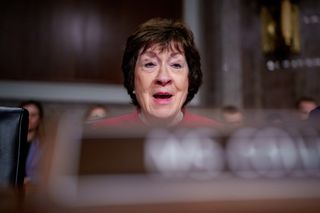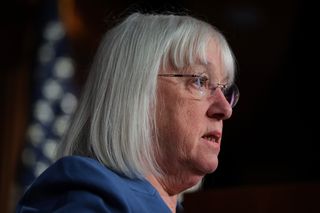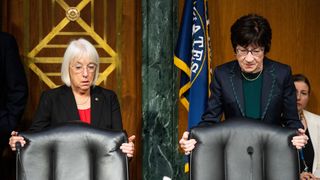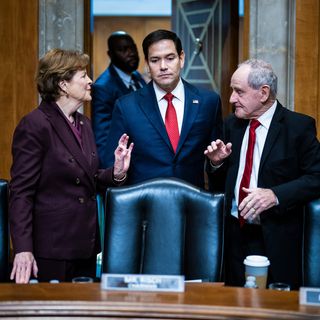What are the Appropriations Committees?
The oft-repeated wisdom in Washington is that there are three parties in Congress: Democrats, Republicans, and Appropriators.1 The majority of all legislation considered before Congress is related to budget authorisations and appropriations.2 Accordingly, the Senate and House Appropriations Committees are understood to be among the most powerful in Congress, overseeing all discretionary spending by the US Government. This includes appropriating funding for the annual National Defense Authorization Act, a bill which, contrary to common misperception, only provides legal authority to appropriate defence funding without actually securing any money itself. It is not uncommon for congressional appropriations to fall short of amounts authorised by other committees like the Armed Services and Foreign Affairs Committees in both chambers,3 even if they frequently exceed the President’s Budget Request. For instance, while the Senate Armed Services Committee authorised an additional $25 billion for the Department of Defense over the Biden administration’s FY25 budget request, the Senate Appropriations Committee authorised only $21 billion in additional funding through emergency funding rather than as part of the Pentagon’s base budget.4
The Congressional ‘power of the purse’ has already been challenged by the second Trump administration, which has sought more expansive control over government spending. The powers amassed by the Department of Government Efficiency (DOGE), the Office of Management and Budget, and the Office of Personnel Management, including their efforts to dismantle agencies and refuse to distribute approved funds, increasingly grate against Congress’s traditional jurisdiction over the contours of US government spending.5 Though the president has a strong grip on the Republican Party, particularly in the House of Representatives, budgetary tensions have exposed gaps between the administration and certain Republican factions in Congress on defence and foreign policy funding.6 A key dynamic to watch in this Congress will be that between these Republican appropriators and the administration in funding international priorities – emerging “fault lines” that are only set to intensify as the FY26 budget-making process ramps up in the coming months.7
What are their subcommittees?
The House Appropriations Committee has 10 constituent subcommittees, while the Senate Appropriations Committee has 12. Unlike the Armed Services Committees and Foreign Affairs Committees in both chambers, Appropriations subcommittees exercise oversight across the breadth of US government policy at home and abroad, meaning that defence and foreign policy issues effectively compete with the suite of domestic policy concerns for full committee attention. Accordingly, defence and foreign policy issues are often not the issues of greatest interest or concern to committee chairs and members.
Members to watch in the 119th Congress
Senate Appropriations Committee
Susan Collins
Current position: Chair, Senate Appropriations Committee
Seat: Republican, Maine
Time spent in Congress: 29 years
Time as chair or vice chair: Chair (January 2021 – January 2023; January 2025 - Present); Ranking Member (January 2023 – January 2025),
Other committees: Senate Committee on Health, Education, Labor, and Pensions; Senate Select Committee on Intelligence
Who are they?
Susan Collins is the most senior female Republican in the Senate and the first female Republican to chair the Appropriations Committee. She has a well-established interest in national security issues, having previously served as ranking member of the Subcommittee on Defense Appropriations and spearheaded the creation of the office of the Director of National Intelligence in 2004-05.8 Collins is a prominent figure in a reportedly dwindling group of moderate Republicans in Congress.9 She has been unafraid to vote against Republican colleagues, only voting along party lines approximately 36% of the time in 2024.10 Her bipartisan efforts are a significant factor behind her consistent political success in her broadly Democratic-leaning home state.11 The Lugar Center at Georgetown University has almost invariably rated Collins as the most bipartisan Senator over the past decade.12 Collins has long warned that “a harsher partisan environment” in Congress poses growing risks to national security funding.13 Collins has said that she will seek re-election in 2026.14
Collins has made a name for herself as one of a small number of Republicans willing to openly break with President Trump. She struggled to maintain the support of Democratic voters in her home state during the first Trump administration, though, in a close-fought race, overcame a Democratic challenger to maintain her seat in 2020.15 Collins was one of only seven Republicans to vote to convict the then-former president following his second impeachment trial in 2021 and subsequently refused to endorse Trump during his 2024 campaign. More recently, Collins was one of only three Republican senators to oppose the confirmation of Pete Hegseth for Secretary of Defense,16 though she voted in favour of other controversial Trump administration nominees. To date, Collins has criticised the Trump administration’s threats not to spend congressionally appropriated money as unlawful and in violation of the Constitution, predicting legal action were it to do so.17

What should Australians know?
Allies and partners
Collins broadly supports efforts to strengthen US allies and partners, though her interests seem to lie more in European and Middle East partnerships than they do in Asia.18 Collins has sought to open allies’ markets to greater American access.19 During President Trump’s first term, Collins criticised his disinterest in diplomacy that “alienat[ed] our closest allies, our longtime friends…and our biggest trading partners” and his tendency to embrace strongmen while distrusting some allied heads of state.20 She has continued to caution against the president’s “reckless” attacks on NATO allies, and consistently voted in support of aid to Ukraine.21 Further, she supported legislation in 2019 to make it more difficult for a president to unilaterally withdraw from the alliance.22
China
Though she has described the national security threat from Beijing as “blatant,”23 Collins’ leadership of China-oriented legislation has mostly been limited to home front issues, including foreign influence, espionage, economics and counter-narcotics issues. She has taken a particular interest in the illegal production of marijuana in her home state by alleged Chinese criminal groups.24 She has also supported efforts to force TikTok to divest of Chinese ownership and to restore “fairness” in the bilateral trade relationship.25 Collins attempted to block the Biden administration’s moves in 2023 to sell oil from America’s Strategic Petroleum Reserves (SPR) to China, based on domestic energy consumption concerns rather than strategic competition,26 and criticised President Trump for asking China to investigate then-candidate Joe Biden in 2019.27 Following the 2023 flight of a Chinese spy balloon in US airspace, Collins joined her Democratic counterpart on the Defense Appropriations Subcommittee in introducing legislation condemning the action and lobbying Biden to factor in efforts to combat such incursions in his annual budget request.28
Taiwan
Collins has generally voted in support of measures supporting Taiwan and has visited the island multiple times. In Defense Subcommittee hearings, she has spoken of the need to arm Taiwan sufficiently to “credibly deter China from using force to accomplish its objectives.”29 Collins was among 25 Republicans to sign a letter in support of former House Speaker Nancy Pelosi’s 2022 Taiwan visit.30 Collins views security challenges across regions as linked and recognises that a failure to thwart any effort by authoritarian actors to change the status quo jeopardises US security -a view inspiring commitment to Taiwan’s defence.31
AUKUS
Maine is the home state for maintenance facilities for nuclear-powered submarines. It is unsurprising, then, that Collins’ most vocal comments on AUKUS have pertained to increasing funding for the US industrial base to meet national and allied requirements. In July 2023, Collins, alongside Senate Armed Services Committee Chairman Roger Wicker (R-MS), co-headed a letter from 25 Republican representatives to the White House conditioning future submarine transfers to Australia under AUKUS on greater investments in the US submarine industrial base to meet expanded demands.32 She was then active in delivering the implied intent of that request, supporting the 2024 National Security Supplemental that included $US3.3 billion for the submarine industrial base outside of the regular budget cycle.33
Foreign policy spending
Collins has described efforts by the Trump administration and DOGE to block approved spending as a “pretty clear” violation of Article One of the Constitution.34 She was the sharpest public Republican critic of DOGE’s dismantling of USAID, faulting the process for neglecting legal requirements to consult Congress and confusing nonprofit workers.35 Immediately after the administration took action against USAID, Collins convened a meeting with a bipartisan group of lawmakers critical of Elon Musk’s activities and expressed additional concerns about DOGE accessing sensitive personal information. She pledged to determine next steps with fellow Appropriations Committee members rather than to simply “rubber stamp” the administration’s proposed cuts.36
On national security, Collins advocates for increased defence spending, including above-negotiated budget toplines agreed by the broader Republican caucus.37 In that respect, Collins was against the sequestration measures as part of the 2011 Budget Control Act and opposed fiscal hawks within her own party seeking to cut spending from the Pentagon and State Department.38 With regards to FY2025 budget appropriations, Collins thinks growing global security threats “must be met with the resolve to invest in a stronger national defence.”39 Collins has consistently supported funding legislation encouraging the Pentagon to pursue multiyear procurement contracting for defence articles, providing greater certainty of demand to manufacturers.40 Such a move is viewed as crucial by Australian defence industry for expanded US-Australian cooperation on guided weapons and explosive ordnance production.41 Collins has also pushed back against the “divest to invest” approach to defence modernisation42 – retiring large numbers of old platforms to fund the development of newer, more advanced capabilities – musing that “quantity has a quality all of its own” and criticising previous administrations for failing to strike a balance between modernising the force and maintaining current capability levels.43
Patty Murray
Current position: Vice Chair, Senate Appropriations Committee
Seat: Democrat, Washington
Time in Congress: 32 years
Time as chair or vice chair: Vice Chair (January 2025 – present); Chair (January 2023 – 2025)
Other committees: Senate Committee on Veterans Affairs; Senate Committee on the Budget; Senate Committee on Health, Education, Labor, and Pensions.
Who are they?
Senator Patty Murray is currently in her sixth term as the senior Senate representative from the state of Washington. Murray is now the most senior Senate Democrat, though in recent years she has stepped back from her long-time role in Democratic Party leadership, having served as chair of the Democratic Senatorial Campaign Committee, Democratic Conference secretary, and assistant Democratic leader. She has sat on the Senate Appropriations Committee since first coming to Congress in 1993, including as chair between January 2023 and January 2025. As Senate Budget Committee chair, Murray worked across party lines to deliver annual funding packages. This included working with her Republican House counterpart to broker a bipartisan budget act in 2013, which raised discretionary and non-discretionary spending above the ceiling set by the 2011 Budget Control Act in exchange for an extension of the caps’ longevity, evidencing her willingness to work around even congressionally-mandated limits in the interests of national security funding.44 Senator Murray’s priority policy issues are predominantly domestic – including the environment and education – and are embodied in her leadership of the Senate Committee on Health, Education, Labor and Pensions. She has sworn that President Trump will not dismantle the Department of Education on her watch,45 arguing that any effort to destroy or remake the Department would require Congressional consultation and certification.46
What should Australians know?
Allies and partners
Murray consistently advocates for US aid to Ukraine and praised the February 2024 Senate passage of the US$95 billion National Security Supplemental as essential to maintaining US alliances and partnerships.47 The supplemental also included military aid to Taiwan. Murray insisted throughout negotiations that the supplemental’s support for different theatres not be split into separate, smaller appropriations “because the reality is these issues are all connected, and they are all urgent.”48 She also argued publicly that passage of the supplemental would prove “that we are still a strong protector of democracy and provider of humanitarian aid” to the world.49 Along with other Democratic senators, Murray co-signed a letter to President Trump in February 2018 expressing the importance of filling the South Korean ambassadorial post to advance US interests in East Asia.50
China
Murray has spoken regularly about the importance of passing appropriations bills and avoiding government shutdowns so as to “stay ahead” of China’s rising economic and military strength. Doing so, according to Murray, will require an “all-of-government” approach that overcomes partisan fights.51 Murray has warned that “China is pressing forward with aggressive modernisation and expansion of their military capabilities”, which requires a strong US response.52 She has tied her domestic legislative priorities such as economic stimulus and the CHIPS and Science Act to US effectiveness in strategic competition with China. Like many of her Senate colleagues, she has connected competition with China with the need to support for Ukraine, saying in October 2023 that “the Chinese Government is watching how we respond to Putin’s aggression in Ukraine.”53 Murray was also part of a bipartisan delegation to Beijing in 2018 pushing for currency reforms, holding talks on Taiwan, Iran and North Korea, and criticising China’s trade practices.54

Taiwan
Murray has supported a range of Asian security initiatives, including the provision of military aid to Taiwan.55 Murray clearly endorsed “making the investments that our nation needs to stay ahead of the Chinese government and other competitors” across the full spectrum of American strategy.56 Though generally supportive of a higher defence topline budget,57 like many Democrats, Murray has also insisted on parity in non-defence spending to reinforce the foundations of American power at home.58 Murray describes diplomatic, economic and political tools of statecraft as fundamentally “connected” to the exercise of military power.59 She views fully funding regional accounts, including the Pacific Deterrence Initiative, as a “critical” means to “stay ahead of China’s military modernization.”60 Murray also played a role in shaping appropriations elements of the CHIPS and Science Act, which authorised roughly $US280 billion to stimulate domestic semi-conductor research and manufacturing, with an emphasis on the non-defence tools of statecraft.61
AUKUS
Though Murray has not publicly specified precise views on AUKUS and a range of acute Indo-Pacific strategic issues, the senator has nevertheless worked in support of a range of initiatives serving these priorities. Within the Appropriations Committee, she advocated for better resourcing all tools of US statecraft, including those intended to strengthen security partnerships AUKUS. As part of a larger package of funding intended predominantly to support Ukraine and Israel, Murray worked to appropriate additional supplementary funding for the US submarine industrial base in the service of accelerating SSN production.62
Foreign policy spending
Murray has tied foreign policy spending – as well as defence spending - to US success in strategic competition with China.63 She argues that “keeping our country safe and competitive is not just about defence spending… [but] means investing in diplomacy and development to counter political and economic coercion, promote stability, stand up to autocrats, support our allies, and advance our global leadership.”64 Like her Republican SAC counterpart Sen. Collins, Murray has criticised Trump administration cuts to USAID and other State Department programs as “lawless”.65 She remarked that “freezing foreign assistance is not putting America first—it is guaranteeing America comes in last. Because every funding gap we leave is an opportunity for our adversaries to step in, fill the gap, and play the hero while casting us as the villain.”66 Murray emphasises the importance of bipartisanship on foreign policy spending to present a united front to the world. To this end she has argued for consistent military funding and support, and against reliance on continuing resolutions and budget instability because of their impact on defence.67
House Appropriations Committee
Tom Cole
Position: Chair, House Appropriations Committee
Seat: Republican, Oklahoma, 4th district
Time spent in Congress: 22 years
Time as chair or ranking member: Chair (April 2024 – present)
Other committees: None
Who are they?
Previously described as an “institutionalist” often at odds with the Republican Party’s right-wing,68 Tom Cole is an 11-term congressman and former history professor at the University of Oklahoma and Oklahoma Baptist University. Cole has sat on the House Appropriations Committee since 2009, and his bid to assume its leadership in 2024 was uncontested. He is the longest-serving Native American congressman in the history of the chamber and the only current member who has chaired both the Appropriations and Rules Committees – controlling both spending and access to the congressional floor. Though he carried his district by a more than 30-point margin in the 2024 elections, he only narrowly retained the Republican nomination following one of the fiercest primaries of the 2024 election cycle from a challenger that criticised Cole for voting with Democrats and enabling deficit spending.69 In the aftermath, early indications suggest that Cole’s views on appropriations have seemingly drifted closer towards his party’s right wing in recent months, and he has insisted that “a Republican House is not going to chain down a Republican president.”70
What should Australians know?
Allies and partners
Though his committee does not have a comprehensively international portfolio, Cole has played an important role in advancing US alliances by shepherding through annual and supplemental defence and foreign operations funding packages within the Appropriations Committee. In 2024, Cole led a bipartisan delegation to the Middle East aimed at strengthening regional partnerships (including the “unbreakable bond” between the United States and Israel) and underwriting regional security.71 He has also joined similar delegations to the Indo-Pacific in recent years, showing support for regional partners like Taiwan, Japan and South Korea.72 He has generally committed to accelerating security assistance packages, noting “if we don’t help our friends in times of need, soon enough, we won’t have any friends at all.”73 However, while Cole has consistently voted in favour of military aid to Ukraine,74 he also claimed more recently that annual appropriations funding such assistance measures were “not a law” in the context of the Trump administration’s decision to freeze aid to Kyiv (legitimating the administration’s decision).75
China
Cole has touted his credentials in pushing back against China’s economic and political influence in the United States and in attempting to undercut Chinese tools of statecraft abroad, particularly in the Indo-Pacific,76 remarking that Beijing seems “more interested in being America’s foe than America’s friend.”77 Cole is a vocal critic of Chinese economic coercion and has co-sponsored legislation aimed at supporting allies and partners to endure and counter coercive behaviour.78 In addition, Cole was deeply critical of China’s perceived lack of cooperation during the pandemic and accused the PRC of manipulating the WHO, remarking: “if you’re not guilty, then don’t act like you’re guilty.” Supporting ‘China week’ in the previous Congress, a period in which many members of the House brought forward China-related legislation, Cole voted in favour of all legislation combatting the “existential” threat posed by the CCP to the United States.79

Taiwan
While Cole’s specific views on Taiwan are difficult to discern from public evidence, he appears broadly supportive of strengthening the island’s deterrent capability. He has described Taiwan, alongside Ukraine and Israel, as “on the front lines of the struggle to preserve democracy and freedom in the world”, while supporting multi-billion dollar budget measures to help Taiwan counter Beijing’s “intimidation” and “influence.”80 He has also visited Taipei as part of a bipartisan delegation.
AUKUS
Cole has proven a low-profile supporter of AUKUS. He co-sponsored the AUKUS Submarine Transfer Authorisation Act in September 2023, later included in the 2024 NDAA, and introduced the beleaguered Indo-Pacific Security Supplemental Appropriations Act, which included additional submarine industrial base funding, that ultimately passed the House. He also called to increase the FY2025 presidential request for appropriations to double submarine procurement from one to two vessels in that calendar year,81 consistent with widely held views among Congresspeople and expert commentators on the construction rate required to reasonably allow for the transfer of submarines to Australia in the future.
Foreign policy spending
Ongoing administration efforts to unilaterally reshape federal foreign policy spending present a complex challenge for Cole. Cole reportedly encouraged Elon Musk to consult members of Congress before pushing through cuts and has a track record of effective dealmaking with Democrat counterparts. Cole is the rare Republican to be regularly endorsed by the American Federation of Government Employees, a federal union with 820,000 members, and there are concerns in his district about the likelihood of layoffs triggered by budget cuts to federal agencies.82 Equally, he has stated his willingness to facilitate Trump’s agenda and has maintained a generally positive relationship with the president throughout his first and second terms to date.83 He did not oppose the administration’s dismantling of USAID, calling DOGE’s efforts a “valuable exercise.”84
In the past, Cole has advocated for increases to defence and foreign policy spending even while pushing for cuts across the federal budget broadly. He believes that the United States faces a “much more dangerous world than we thought it was only two or three years ago” and that “the overall budget is out of balance” to meet the challenges of the times.85 Under the Fiscal Responsibility Act, he recognised that it was “difficult for us to do some things that I think we need to do,” but was blunt that he thought the previous administration’s requested defence budget was too low.86
Cole previously endorsed the idea that US defence spending needed to increase by 3-5% in real terms to meet America’s national defence requirements, but with the caveat that the Pentagon also needed to exercise greater fiscal discipline.87 For instance, while supportive of a “divest to invest” approach to force structure taken by the Biden administration, he has bemoaned a lack of funding to help the military services accelerate those programs.88 Importantly, Cole supports robust funding for both the Defense and State Departments to ensure that the tools of American international statecraft can work in unison,89 remarking that “investing in development and diplomacy is a crucial component of our nation’s national security toolkit and showcases the very best of American values to the world.”90 He has supported an array of foreign aid and assistance efforts for developing countries to build partnerships.91
Rosa DeLauro
Current position: Ranking member, House Appropriations Committee
Seat: Democrat, Connecticut, 3rd District
Time spent in Congress: 34 years
Time as chair or ranking member: Ranking member (January 2023 – present), chair (January 2021 – January 2023).
Other Committees: None
Who are they?
Rosa DeLauro has served in Congress since 1991 and was a founding member of the Congressional Progressive Caucus. DeLauro chaired the House Appropriations Committee during the 117th Congress and served as the committee’s ranking Democratic member since 2023. Fellow Democrats praise her leadership in this committee for her effective management of the Democratic caucus and strength as a negotiator.92 She has also worked closely for years with current committee chair Tom Cole, who has described her as “very capable.”93 Like her Senate Democratic counterpart Patty Murray, DeLauro’s focus is habitually trained on healthcare and education issues, cemented by her senior role on the Labor, Health and Human Services Subcommittee. Since President Trump’s inauguration, she has fiercely criticised administration efforts to “rob appropriated funds” by freezing funding.94

What should Australians know?
Allies and partners
DeLauro’s legislative efforts during her time in Congress have primarily focused on domestic issues rather than foreign policy. However, she has a recent track record of supporting defence spending and foreign aid in the Indo-Pacific through measures including the National Security Supplemental and has spoken publicly about the need for the United States to maintain its competitive economic and military edge over its adversaries through nurturing its alliances. She remarks that “when we retreat from the global stage, China and Russia fill in the gaps, and the world becomes a more dangerous place.”95 In Asia, DeLauro has been an ardent supporter of alliances with “Japan, Taiwan, South Korea, and the Philippines” and has warned that “[r]etreating from Asia… would be a colossal mistake.”96 She encourages the provision of funding to Indo-Pacific allies to counter “China’s aggressive and adversarial posture.”97
China
To the extent that DeLauro has articulated her views on China, these have been framed around economic security and industrial policy concerns, including market access and technology security. Indeed, she has a long record of interrogating the practices of state-owned Chinese enterprises in the American market and has pushed for new or reformed regulations to limit the access that these companies have to US government tenders, including Pentagon contracts, and the American market more broadly.98 In 2024, DeLauro authored legislation that directed the government to tighten rules on US investments in Chinese technology firms including AI, quantum computing and semiconductor manufacturing in the interests of onshoring more development and production.99 She criticised Elon Musk in his capacity as head of the Department of Government Efficiency for attempting to derail the bill in the current congress.100 Elsewhere, DeLauro voted in support of the Protecting Americans from Foreign Adversary Controlled Applications Act to force TikTok to end its Chinese ownership to continue operating in the United States.101 She expressed concern that an app controlled by “one of the United States’ most prominent adversaries” could be used “to spy on Americans or to manufacture public opinion.”102 She has also criticised carve-outs for Chinese companies from certain de minimis e-commerce regulations.103
Taiwan
DeLauro advanced the 2024 Indo-Pacific Security Supplemental Appropriation Act that provided US$3.9 billion for Taiwan and other regional allies, framing support for Taipei as a proxy for America’s overall commitment to regional security.104 DeLauro also co-sponsored the 2023 United States-Taiwan Initiative on 21st Century Trade First Agreement Implementation Act, which aimed to deepen cooperation and promote economic innovation between Taiwan and the United States.105
AUKUS
DeLauro has made no detailed comments relating to the AUKUS partnership, though she has indirectly demonstrated her support through her backing of regional alliances and defence cooperation, as well as the National Security Supplemental Bill, which included money for the US submarine industrial base.
Foreign policy spending
DeLauro has insisted on equal funding for both “guns and butter,” linking her support for higher defence and foreign policy spending to increased resourcing of domestic programs.106 For instance, she was highly critical of the Fiscal Responsibility Act and debt ceiling agreement reached between President Biden and congressional Republicans in 2023 for disproportionately restricting domestic programs over defence spending.107 At the same time, DeLauro has bemoaned budget measures that have wilfully or inadvertently restricted funding for the Pentagon or State Department, including measures like the sequestration triggered under the 2011 Budget Control Act and repeated continuing resolutions.108 She described these measures as “bad for our military” and at odds with the imperatives created by the “rising influence of China.”109 To that end, she has publicly thrown her support behind eliminating the federal debt limit entirely, a view shared by President Trump.110 DeLauro views the Trump administration’s aid freeze and disabling of USAID as “unlawful”, as well as “disastrous” and “inhumane.”111 She has sought to counteract DOGE’s sweeping changes to federal funding projects by deeming them unconstitutional.112
Appendix. Appropriations Committee Members
House of Representatives
Republican
- Tom Cole (R-OK 04)
- Harold Rogers (R-KY 05)
- Robert Aderholt (R-AL 04)
- Michael Simpson (R-ID 02)
- John Carter (R-TX 31)
- Ken Calvert (R-CA 41)
- Mario Diaz-Balart (R-FL 26)
- Steve Womack (R-AR 03)
- Charles Fleischmann (R-TN 03)
- David Joyce (R-OH 14)
- Andy Harris (R-MD 01)
- Mark Amodei (R-NV 02)
- David Valadao (R-CA 22)
- Dan Newhouse (R-WA 04)
- John Moolenaar (R-MI 02)
- John Rutherford (R-FL 05)
- Ben Cline (R-VA 06)
- Guy Reschenthaler (R-PA 14)
- Ashley Hinson (R-IA 02)
- Tony Gonzales (R-TX 23)
- Julia Letlow (R-LA 05)
- Michael Cloud (R-TX 27)
- Michael Guest (R-MS 03)
- Ryan Zinke (R-MT 01)
- Andrew Clyde (R-GA 09)
- Stephanie Bice (R-OK 05)
- Scott Franklin (R-FL 18)
- Jake Ellzey (R-TX 06)
- Juan Ciscomani (R-AZ 06)
- Chuck Edwards (R-NC 11)
- Mark Alford (R-MO 04)
- Nick LaLota (R-NY 01)
- Dale Strong (R-AL 05)
- Celeste Maloy (R-UT 02)
- Riley Moore (R-WV 02)
Democrat
- Rosa DeLauro (D-CT 03)
- Steny Hoyer (D-MD 05)
- Marcy Kaptur (D-OH 09)
- James Clyburn (D-SC 06)
- Sanford Bishop (D-GA 02)
- Betty McCollum (D-MN 04)
- Debbie Wasserman Schultz (D-FL 25)
- Henry Cuellar (D-TX 28)
- Chellie Pingree (D-ME 01)
- Mike Quigley (D-IL 05)
- Grace Meng (D-NY 06)
- Mark Pocan (D-WI 02)
- Pete Aguilar (D-CA 33)
- Lois Frankel (D-FL 22)
- Bonnie Watson Coleman (D-NJ 12)
- Norma Torres (D-CA 35)
- Ed Case (D-HI 01)
- Adriano Espaillat (D-NY 13)
- Josh Harder (D-CA 09)
- Lauren Underwood (D-IL 14)
- Susie Lee (D-NV 03)
- Joseph Morelle (D-NY 25)
- Mike Levin (D-CA 49)
- Madeleine Dean (D-PA 04)
- Veronica Escobar (D-TX 16)
- Frank Mrvan (D-IN 01)
- Marie Gluesenkamp Perez (D-WA 03)
- Glenn Ivey (D-MD 04)
Senate
Republican
- Susan Collins (R-ME)
- Mitch McConnell (R-KY)
- Lisa Murkowski (R-AK)
- Lindsey Graham (R-SC)
- Jerry Moran (R-KA)
- John Hoeven (R-ND)
- John Boozman (R-AR)
- Shelley Moore Capito (R-WV)
- John Kennedy (R-LA)
- Cindy Hyde-Smith (R-MS)
- Bill Hagerty (R-TN)
- Katie Britt (R-AL)
- Markwayne Mullin (R-OK)
- Deb Fischer (R-NE)
- Mike Rounds (R-SD)
Democrat
- Patty Murray (D-WA)
- Richard Durbin (D-IL)
- Jack Reed (D-RI)
- Jeanne Shaheen (D-NH)
- Jeff Merkley (D-OR)
- Christopher Coons (D-DE)
- Brian Schatz (D-HI)
- Tammy Baldwin (D-WI)
- Chris Murphy (D-CT)
- Chris Van Hollen (D-MD)
- Martin Heinrich (D-NM)
- Gary Peters (D-MI)
- Kristin Gillibrand (D-NY)
- Jon Ossoff (D-GA)









